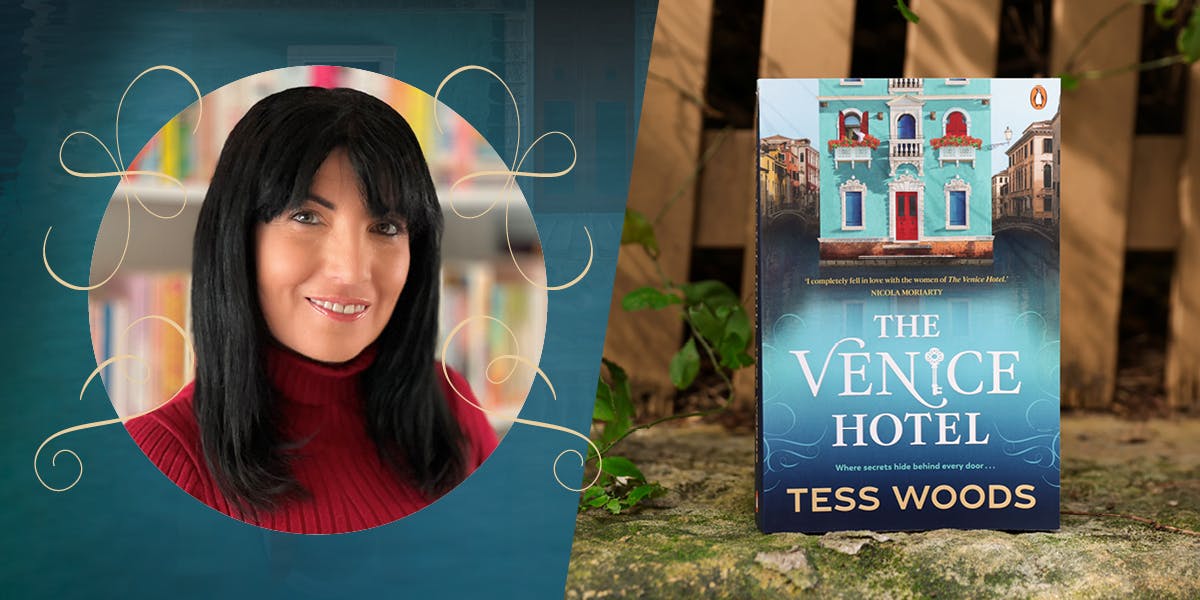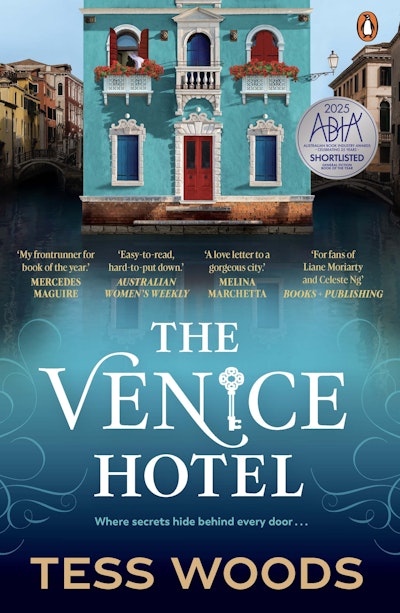Plus, find out how her unique writing routine differs from other authors.
We caught up with Australian author Tess Woods to learn about her upcoming book, The Venice Hotel.
Read on to learn more about her book, her unique writing routine and the incredible lunch she cooked for Perth booksellers based on the novel.
Q&A with Tess Woods
You often write about the bonds between women. Why are those specific relationships important to you and a common topic in your writing?
I came onto the scene as a romance writer but I very quickly changed what I wanted to write about because I find relationships between women infinitely more interesting.
The bond between mothers, daughters and friends have so much more depth to them than a straight out ‘love story’, even though I also write love stories into my books.
Writing about women who have each other's backs through difficult times and women being able to rely on each other is such an interesting thing to explore.
I think the mother-daughter relationship is a particularly complex one to explore.
Yeah, absolutely – that's who I dedicated my book to: ‘This is for all the mothers and daughters.’
It’s your first bond, a strong relationship that you're born into. Along the way, that relationship can get damaged and strained, but no matter what – even for mothers and daughters who aren't on speaking terms – that bond can never be broken.
You may have many loves in your life, but you’ll only ever have that mother-daughter relationship with one person.
Does your daughter read your books? Has she read this one?
She does. She's always one of my first readers.
My mum also read it and she's been really supportive and beautiful. She’s my number one fan. I'm very lucky to have them both.
The Venice Hotel weaves together multiple narratives from four main characters. Did you have to plan out how all their stories would intertwine, or is that something you figure out as you write?
It would have been a lot better for all of us if I did plan!
Every time I go to write a new book I think, ‘OK, this is the book I'm going to plot. I’m not going to write in circles.’
It doesn’t happen. I can't write that way even if I try! It doesn't work for me. I have to sit at the computer and not know what's coming next.
It can make things really complicated, and I dig myself into holes, but thankfully with the help of very good editors, I eventually find my way out.
Do you have a set number of words that you aim for or any underlying structure to your writing process?
I aim for 2,000 words in a session, and that's mainly because I work, so I have to be effective when I sit down at the computer.
I only have three writing days planned out in my weeks, so I'm very strict with myself. When writing, I don't let myself get up except to go to the toilet. Nothing else can happen. There are no snacks.
I also roughly know where each character will be at the start and where they’ll be by the end. Then, it's just a matter of connecting the dots all the way through the book to get to the ending that I want.
Did you have a favourite character to write and do your opinions of the characters change as you go through that writing process?
My opinions do change depending on what characters are up to during the book.
Writing this book, my heart was with Loretta Bianchi, the owner of the hotel. I love to bake and she's someone who just lives to bake.
Sophie probably reflects me most me as a person, but Loretta is who I want to be.
With that intense writing schedule, how do you replenish your creativity to then be able to sit down the next day and do 2,000 words again?
I get a lot of inspiration from reading. I read every night, and it helps me wind down while being inspired by beautiful writing.
Honestly, sometimes I'm not feeling replenished at all, but I treat writing like a job. No matter what, I have to do it and to get those words done.
Some of my friends who are authors avoid reading books in the genre they’re writing, but contemporary women's fiction is always number one for me. I think I'm a bit of an outlier in so many ways, and this is just one more thing that I do differently to other writers.
You’re quite connected to many authors, so you have the inside scoop. How else have you found that process differs from others’?
A lot of my author friends live and breathe writing – it’s what they’ve always wanted to do.
For me, it just hit me out of left field one morning.
Before that, I’d never written anything – not even a letter of complaint to a newspaper. I had absolutely no aspirations to do so, and I was really happy and satisfied in my job as a physio. After I wrote the first book, I just wanted to write another book and another book.
I’ve never written anything apart from my books that have been published, so I don’t keep journals of ideas, write short stories, enter competitions – nothing like that.
All I've done is written these four books that have been published, so I think in that way I'm very different to other writers.
Do you take breaks in between ideas?
That’s actually another way that I really differ from other writers: I have very long periods of time where I have no inclination to write at all.
I'm in one of those periods now. I haven't written for months. I won't be writing until November, and then I will sit down and write this next book.
I just write as much as I can in a six-to-eight-month period, and then I have a very long time off. My other author friends still have the urge to write all the time, so if they're not writing their books, they write Substack articles or short stories and I don't have that desire at all.
Maybe that's one way that I replenish as well, having long breaks away from writing.
You already mentioned that you love cooking and baking, and you actually cooked an incredible meal inspired by The Venice Hotel for Perth booksellers. Why did you want to do that?
When I went to write The Venice Hotel, I suffered burnout.
I didn't want to write anymore, but this story would not go away. While I was writing those hard early drafts, I told myself that if I finished this book, I would throw a long-table lunch and cook all the food in the book. I imagined how special that would be, so it became a driving force for me to actually finish the story.
There are so few popular fiction authors here in Perth, so local booksellers really celebrate us when our books come out. For my previous books, the booksellers had been extraordinary in their support, so it was also a way to thank them for what they've done in the past.
I convinced the team at Penguin to let me host this lunch in my backyard, and I cooked for three whole days. I took time off work to cook that lunch because I did everything from scratch! A lot of the recipes in the book were my recipes that I've tried and tested in my own kitchen, so I wanted to bring it all together.
None of the booksellers had actually read the book at the time, but I've heard from so many of them afterwards that as they've read it, they remember trying the different recipes.
Why did you decide to set the book in Venice?
I'm in love with Venice! It is my favourite city in the whole world. I'd wanted to go my whole life, but it took me until I was forty-one to actually get there. When I arrived, I cried the whole way from the airport to the hotel. I was sobbing on the water. I was sobbing, walking on the street. I was overwhelmed with the beauty of Venice. It was everything I’d hoped it would be.
When I first got a publishing contract, I promised myself that I would set a book in Venice.
At first, I thought I was going to write a foodie story, but when I went back to Venice and started interviewing the people, I realised how desperate the Venetians are for the city to survive. They're screaming into the void. Their city is besieged by tourists who are completely ruining their land, the water levels are rising, and no one cares.
I wanted to get into that psyche of how someone lives day-to-day with that knowledge. How do you go about your business when the world doesn’t care that your city is sinking and the water levels are rising and no one's doing anything to stop that, including your own government?
The book ended up being a much more environmentally-themed book than what I originally imagined, and I'm ashamed to admit that I went to Venice not really thinking about the environment. I'm hoping that this book can get people thinking and doing more thoughtful tourism when they go to Venice.
Is there anything else that you really wanted to make sure comes across or you really want people to know about this book?
The point of my books is to entertain above all else. I want people to forget their lives and problems and be swept up in a story.
But in The Venice Hotel, I also really wanted to talk about coercive control and domestic violence in a way that some women might recognise. I’m hoping that readers in those kinds of relationships can use the book as inspiration to leave, if they can.
If one woman left an abusive relationship after reading this story, then I'd feel like my work was done.
Interested? Read a snippet of The Venice Hotel, here.













